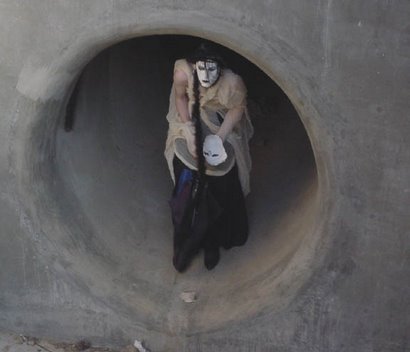This is the downside of sharing a blog with one’s significant other. I’m forced to read her topics of graduate school discussion, which are always the coolest topics around. Basically sex and death in their various manifestations. I’m not hesitant to publicly admit that I’m envious and, ideally, would be working toward a degree in philosophy or an MFA wherein I could discuss sex and death to my contentment. Unfortunately, I’m stuck learning about the intricacies of pork-barrel legislation and the questions you can(not) ask during a job interview. The most risqué topic that I’m likely to encounter would be the secret relationship between Ben Bernanke and the French Franc before it went out of circulation. Or maybe Alan Greenspan reads trashy romance novels and daydreams about using the words inflation and fishnet in the same Beige Book. Not nearly as exciting as learning that the author of Alice in Wonderland was the day’s Michael Jackson.
Lately, I’ve been trying to articulate my poetic aesthetics (rhyming not a prerequisite). In no particular order:
1. To be vague, I like poems that take chances. Your traditional narrative poem, broken neatly into tercets or quatrains and with a conservative arc, just doesn’t cut it for me. Sure, I still read my fair share of these poems, but, often, they do little to inspire or, ultimately, interest me. I may take away a good image or even a nice phrase, but since I’m a capitalistic man (time is money!), one memorable phrase / image per poem doesn’t cut it.
This statement has many exceptions as there are numerous authors who seem to use more traditional “forms” in order to challenge them, give their work some subversive feel, or even imbue their words with an unrealized energy. Rock on!
1a. Stringent logic isn’t a concern. While I hope the writer isn’t flipping through a photo album and is just naming objects, I’m not concerned with whether a particular relationship seems ill-defined or if something seems out of place. Go ahead – make the poem surreal, unconventional, and thought-defying. I like to unravel puzzles and be intellectually challenged.
1b. I’m less and less concerned about abstraction, which could be closely related to my penchant for far-out, philosophical / experimental poetry. I’m not concerned with whether every image or idea is firmly grounded in reality. So what if the poem is nebulous or the relationships are post-structural in nature. Good – it makes the poem worth reading again. This doesn’t apply to abstraction used in traditional ways (trees are pretty, beer is hoppy, etc.)
1c. Give me a poetic epistemology that is outside of the poem itself. I enjoy poems that have a meaning posterior to the actual text. Once again, I don’t necessarily think, for book purposes, poems should have a narrative arc. But if you have 12 poems that ruminate on why God isn’t a cannibal, then put those twelve poems together. Who cares if they’re not a series or if they are all completely different?
2. Like Jeff Bahr and others, I prefer work that gets its job done quickly. If a poem stretches five or six pages (or book-length), I’m likely to be found asleep or in another journal / book.
There, two main points and three sub-points created haphazardly.
Nothing new on the poetry front for quite awhile. I will be sending off a new batch this weekend, and I’m setting a post-graduation target to begin paper submission to the old print publication dinosaurs. I’m still not thrilled with the idea, but there are many quality print pubs and the online universe is only so big for my rapid and amazing fame.
Despite the news / calendars / years of historical tradition, Valentine’s Day is actually tomorrow because that’s when B and I are celebrating. If you celebrate today, you’re lame.
-j

Wednesday, February 14, 2007
Subscribe to:
Post Comments (Atom)

No comments:
Post a Comment